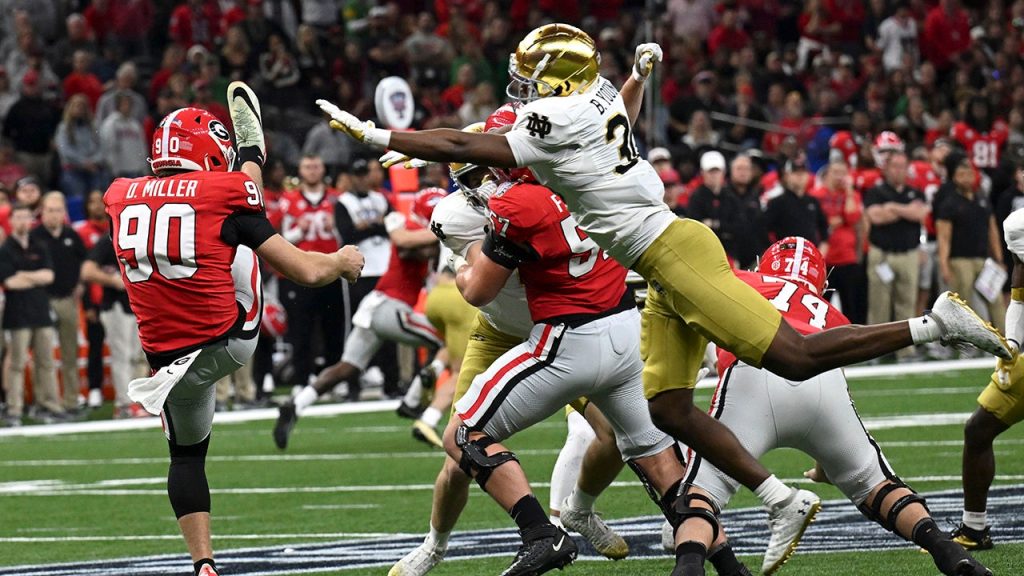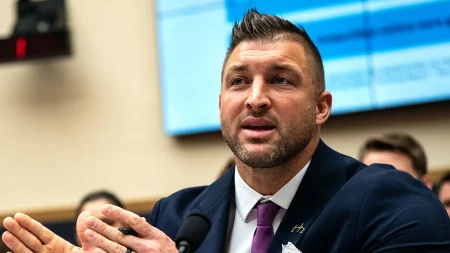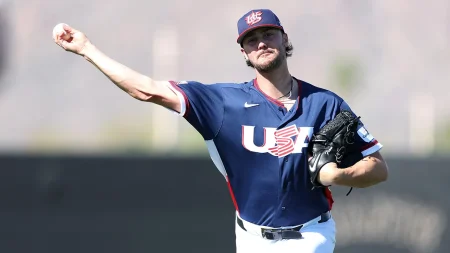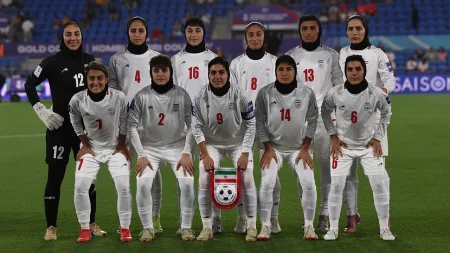The Notre Dame Fighting Irish faced a challenging start against the Georgia Bulldogs in their College Football Playoff quarterfinal matchup at the Sugar Bowl. The game, held at the Superdome in New Orleans, was postponed by a day following a tragic terror attack on Bourbon Street that resulted in numerous casualties and injuries. Despite the somber backdrop, the game proceeded, with Louisiana Governor John Bel Edwards attending the game and assuring the public of the Superdome’s complete security.
The Fighting Irish encountered early setbacks, beginning with back-to-back penalties on defense during Georgia’s initial possession. True freshman defensive lineman Bryce Young was flagged for running into the kicker, punter Drew Miller, on consecutive plays. While the first penalty resulted in a 5-yard gain for Georgia, the second was declined. Notre Dame’s offensive struggles compounded their initial woes. Quarterback Riley Leonard was penalized for an illegal forward pass after attempting two passes on the same play. The first pass was deflected by Georgia defensive lineman Mykel Williams, and Leonard, after catching the deflected ball, attempted a second pass that fell incomplete.
The first quarter concluded with a scoreless tie, highlighting the defensive prowess of both teams. Georgia’s defense effectively stifled Notre Dame’s offense, limiting them to a mere 24 total yards. Leonard completed only one pass for 14 yards, demonstrating the Bulldogs’ ability to contain the Fighting Irish passing attack. The defensive battle continued into the second quarter, with both teams managing to add points through field goals. This back-and-forth exchange of field goals underscored the tightly contested nature of the game.
The penalties against Notre Dame early in the game disrupted their rhythm and momentum. Running into the kicker twice on the same drive is a rare occurrence, especially for a team of Notre Dame’s caliber. These infractions gifted Georgia valuable yardage and extended their opening drive, although they ultimately failed to capitalize on the opportunity with points. The illegal forward pass penalty against Leonard further hampered Notre Dame’s offensive efforts, adding to their difficulties in moving the ball against a formidable Georgia defense.
The low-scoring affair in the first half reflected the defensive strengths of both teams. Georgia’s defense effectively neutralized Notre Dame’s offensive threats, while the Fighting Irish defense also held their own, preventing the Bulldogs from establishing a significant advantage. The limited offensive production from both sides underscored the strategic nature of the game, with each team seeking to exploit any potential weaknesses in their opponent’s defense.
The Sugar Bowl, played under the shadow of the recent tragedy, carried significant weight for both teams. The postponement added an emotional layer to the game, as players and fans alike grappled with the aftermath of the attack. The presence of the Louisiana Governor served as a symbol of resilience and determination, reinforcing the message that the game would proceed as a testament to the strength of the community. The close score at halftime set the stage for a potentially dramatic second half, with both teams vying for a place in the next round of the College Football Playoffs.














